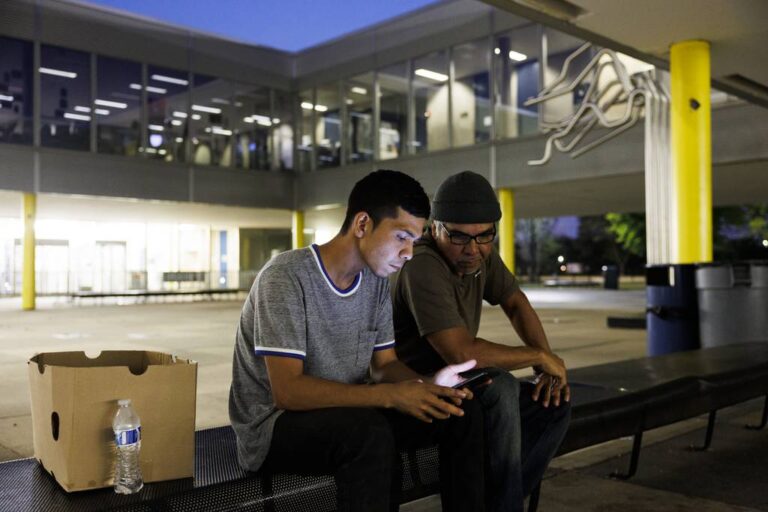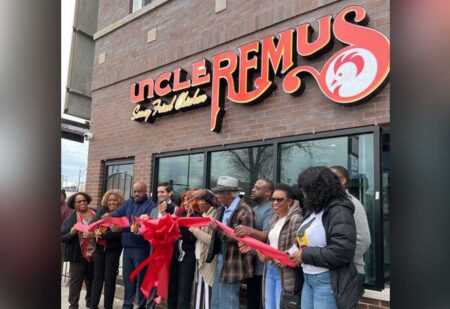Huberth Espinoza, 65, sat on a bench outside the 5th District police station in Pullman on a Wednesday in late June, waiting to be picked up for work.
An asylum-seeker from Venezuela, Espinoza said he came to Chicago to work but could not immediately get a job permit. So he worked for about two weeks for a man who would take him and other migrants to do odd jobs — construction, painting and yardwork — but he had not been picked up or paid in a week.
Espinoza said he was owed about $600.
“He told us he’d be back at 9 a.m., but he never came. We don’t know if he’s going to pay us,” he told the Tribune.
For most migrants, finding work is volatile and sometimes dangerous because they lack work authorization permits. And while many migrants work under the table, leaving them vulnerable to exploitation, Illinois business owners say they have open jobs they can’t fill. Business leaders, along with Gov. J.B. Pritzker and other political leaders, have urged the federal government to expedite the process.
Last month, more than 100 employers and business group leaders from more than a dozen states, including Illinois, signed an open letter coordinated by the American Business Immigration Coalition asking the White House to allow states to sponsor work permits for new migrants and longtime undocumented workers.
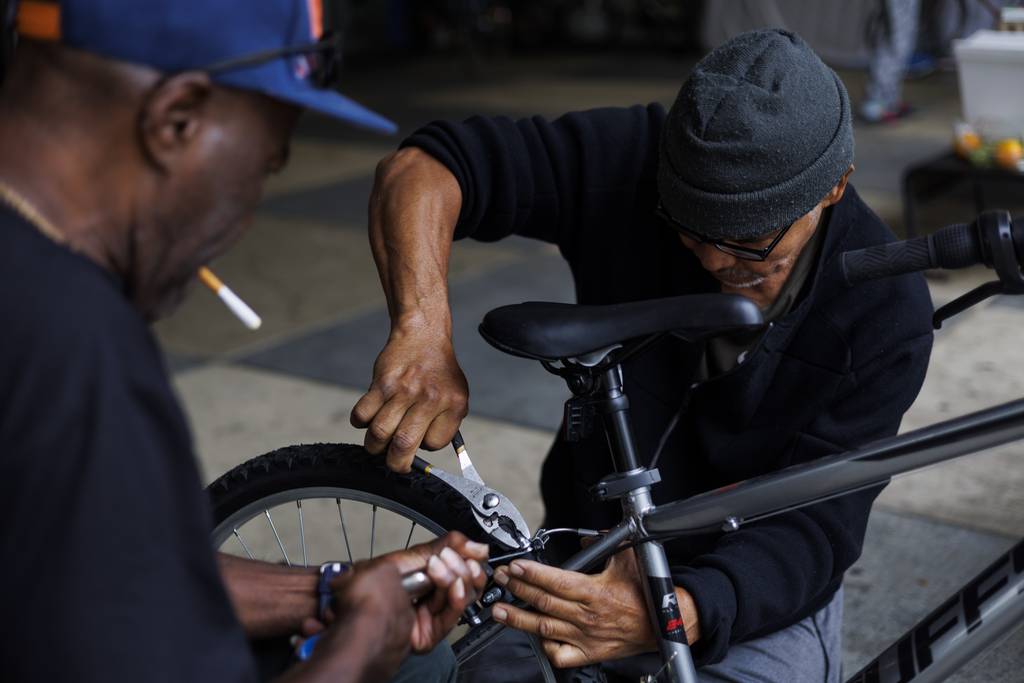
Signatories include leaders of the Chicagoland Chamber of Commerce, the Illinois Restaurant Association and the Illinois Manufacturers’ Association.
On Friday, U.S. Rep. Jesús “Chuy” García began circulating a letter urging President Joe Biden to provide and expedite work permits to both new migrants and long-term contributing immigrant workers — including DACA-eligible, farmworkers and essential workers — as “one of the more sensible solutions, which are key to addressing America’s labor shortages and lowering inflation.”
“The solution to labor shortages is right here at hand,” he said. “In addition to that, it helps to address the cost of migrants and providing them with food and shelter because if they can gainfully work with authorization, then we won’t be scrambling to find funding for New York, Chicago and LA, or other cities, because it’s having a real impact on those budgets.”
In a statement, a spokesperson for Pritzker said the governor had met with White House officials “urging them to expedite work authorizations so that those who wish to live and work in Illinois can do so with dignity and respect.”
More than 10,000 asylum-seekers, mostly from Venezuela, have arrived in Chicago since August, when Texas Gov. Greg Abbott began busing refugees to cities led by Democrats. Many migrants are living in harsh conditions in city-run shelters or police stations; the Chicago Police Department said earlier this month it was investigating alleged sexual misconduct by at least one officer against a migrant or migrants, potentially including a minor, housed at a West Side police station.
Many migrants have left the shelters to find work and a place to live, even if it could affect their chances of getting asylum, or if the pay is low and the job conditions are poor, Kalman Resnick, an immigration lawyer, said during a panel with the Neighborhood Building Owners Alliance on how the real estate industry can help the new arrivals.
The timeline to file for asylum and subsequent job authorization depends on each migrant’s case and several factors including their way of entry to the U.S. and what policies were in place at the time, said Katherine Greenslade, director of the Resurrection Project’s legal clinic, a nonprofit that provides services for migrants. “It’s complex and lengthy; that’s why we recommend legal counsel,” she said.
In most cases, asylum-seekers cannot apply for permits to work legally in the U.S. until five months after they’ve submitted their asylum applications, something many are not able to do until they’ve already been in the country for months.
“Many of them are in shelters or in various unstable housing situations where getting a legal screening is just not the first or even the fifth thing on their mind,” said Megan Davis, the director of legal services at Erie Neighborhood House, a nonprofit that provides legal aid and other help to migrants.
It can take more than six months, on average, for a person to receive a work permit after they file an application, Greenslade said.
The backlog of applications at U.S. Citizenship and Immigration Services has slowed processing times even further, meaning some applicants for work permits must wait up to 15 months from the time they apply, according to García’s letter.
In the meantime, many migrants work under the table. Their work can be precarious, leaving them with unpredictable schedules, earnings and at higher risks of exploitation, wage theft and abuse. And working illegally, especially if they do so by using fake documents or documents that belong to U.S. citizens, can ultimately have adverse impacts on migrants’ immigration cases, legal aid attorneys said.
In Venezuela, 30-year-old Patricia Moyeja was four months away from getting a degree in nursing when she came to the United States. Twenty-three-year-old Julianna Ovalles was studying to be a police officer, and her sister Alexa, 22, was studying business management.
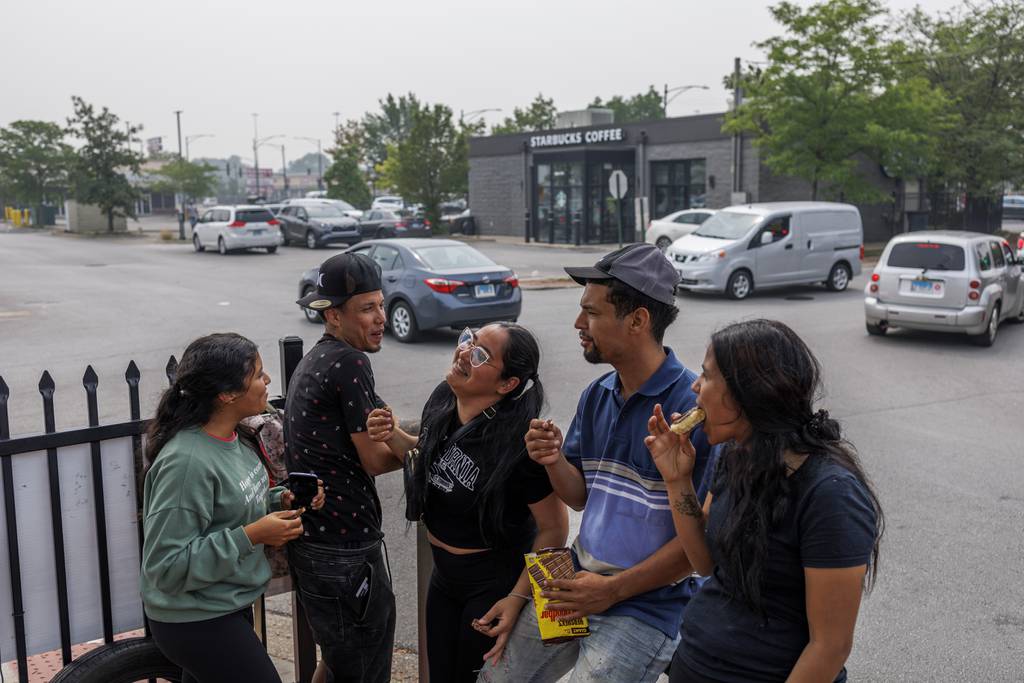
The women, who now live in city-run shelters, waited for work in late June in the parking lot of a Home Depot in the Chatham neighborhood, where hundreds of people were looking for jobs.
“We’ve been coming here for a week. We are looking for jobs cleaning houses, painting, whatever we can find,” said the younger Ovalles sister.
The job search would be easier if she had a work permit, said her older sister, Julianna. For now all they can do is wait and hope for the best, she said. The women said they make $120 to $150 a day if they’re lucky.
“We are good, we’re safe here. I like the city of Chicago, but we need more opportunities to work. We came here to work,” she said.
Day laboring has become a common way for migrants in Chicago to find work. Like the two sisters, many go stand by hardware stores, waiting to be approached and offered a job. They work as contractors and get paid in cash, typically by the day.
Even migrants who have college educations or have worked in skilled professions including accounting, teaching, nursing or the law have to take on precarious jobs that in the long run won’t allow them the opportunity to learn English, said Laarni Livings, a head volunteer with a network of volunteers in the South Loop area.
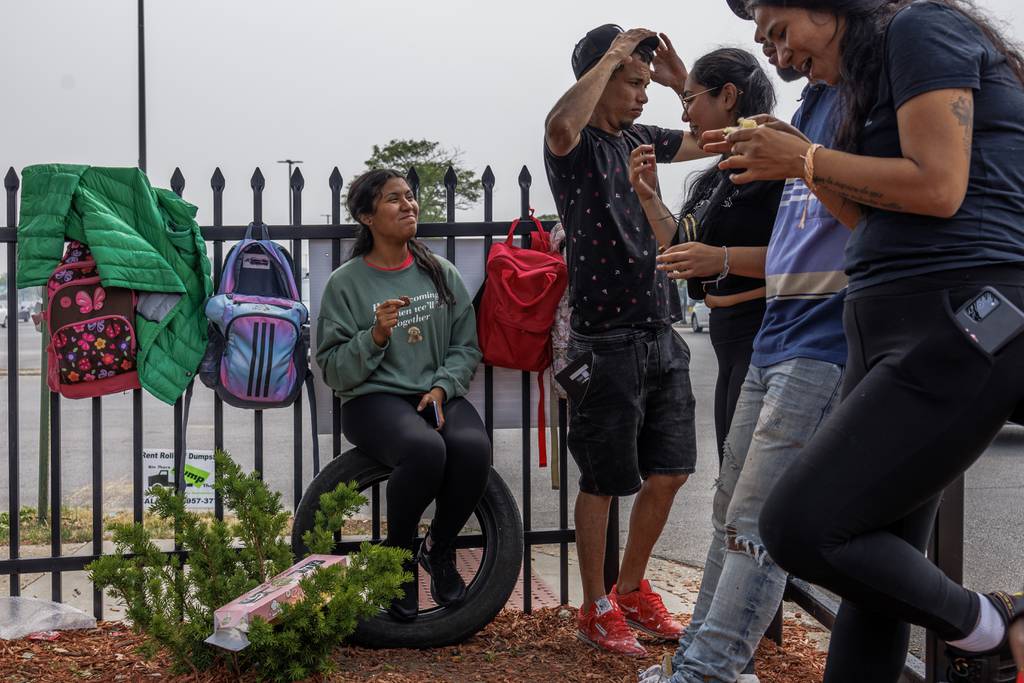
Legal aid workers in Chicago said they believed very few of the new asylum-seekers have received work permits.
The Resurrection Project has assisted a “handful” of new arrivals who are far enough along in the legal process to apply for work permits, but most of their applications are still pending, Greenslade said. Only one asylum-seeker whom the group has worked with has received a work permit; that person was able to submit their asylum application last fall, she said.
At Centro Romero, an organization that provides social services for the immigrant community, the legal department has screened over 2,000 new arrivals since last fall, said Diego F. Samayoa, associate director. Of those, fewer than 5% have been approved so far, he said, adding that they are concerned many applicants may be denied because their parole has expired.
Most asylum-seekers are paroled into the country, which means they are allowed in temporarily to process their asylum case. U.S. Citizenship and Immigration Services could, at its discretion, grant a parolee temporary employment authorization, if it is not inconsistent with the purpose and duration of their parole.
That, however, is rare, Greenslade said. Most people paroled in are given a year or just a few months in the country, so they won’t get the permit on time, or if it arrives, it’ll be expired.
When a mother from Venezuela, who declined to give her name, arrived in the Chicago area last September, she sent out her application for employment authorization with the help of Centro Romero. But her parole ended at the end of November, which means that even if she gets approval from USCIS, the permit could be expired by the time it arrives.
Most of the asylum-seekers in shelters may not have even started the process, as they wait to be connected with legal counsel, Greenslade said. But the number of migrants in need of legal services surpasses existing nonprofit legal capacity, and most cannot pay for a private attorney, she said.
But as migrants wait for work permits, Chicago businesses want to hire them.
“Everybody’s short on workers right now,” said Brad Tietz, vice president of the Chicagoland Chamber of Commerce. Migrants looking for work, he said, would be a welcome “pool of talent” to enter the area workforce.
There are upward of 1,800 open hotel jobs in the Chicago area, according to Indeed.com. The hotel industry, which has struggled to fill positions after losing workers during the pandemic, has lobbied in Washington for a bill that would shorten the time migrants must wait for work permit eligibility to one month after they apply for asylum.
Michael Jacobson, president of the Illinois Hotel & Lodging Association, said the labor shortage is present across the hotel industry, but the need is particularly acute for culinary workers.
“When there’s a banquet for 1,000 people at one of our big hotels downtown, just imagine how many people are needed to service that meal,” he said. Most city hotels now pay over $23 an hour as a starting wage, Jacobson said.
“There are people who are living in hotels who have applied for asylum and they are not allowed to work in the hotel,” said Chirag Shah, executive vice president of the national hotel association. “In a lot of circumstances, the hotels have open jobs.”
Sam Sanchez, who owns Chicago bars and restaurants including Old Crow Smokehouse and Moe’s Cantina, said he exchanged phone numbers with migrants hoping to find work when he volunteered at a food distribution in the spring.
Sanchez, who also owns a construction company, said some migrants who were skilled plaster finishers pulled up images of their work to show him on their phones.
“I got their number, I can’t wait,” Sanchez said.
The restaurant industry, like the hotel industry, took a beating during the pandemic and has struggled to fill jobs even as consumer demand has bounced back.
“A lot of people went to work construction, and they never came back,” Sanchez said. “People just moved on.”
Sanchez, who is also chair of governmental relations for the Illinois Restaurant Association, referenced the funding Chicago has allocated to help migrants. In May, the City Council approved $51 million for spending on migrant care, which mostly covered the expenses of agencies contracted to run city-run shelters, according to Mayor Brandon Johnson’s deputy chief of staff, Cristina Pacione-Zayas.
“If we would allow them to have work visas, the city of Chicago would not be spending that kind of money,” Sanchez said. “Allowing them to come in and not allowing them to work becomes a burden on the city, the state and the federal government. They don’t want to be a burden. They want to work. And we need workforce.”
Brayan Lozano, an asylum-seeker from Colombia, echoes the leaders’ plea. He’s been in the city for nearly three months. With the help of volunteers, he has found an apartment to rent, which he pays for with money he earns as a self-employed contractor.
“We come here to work, we want to contribute to society at the same time that we help our families,” Lozano said in Spanish.
“We don’t want to be a burden to the government,” he said.
Shelly Ruzicka, a workers’ rights advocate with Arise Chicago, said it is important for migrants to know they have the same rights as any other workers, regardless of their immigration status, whether working in factories, for companies or as day laborers.
Ruzicka urges migrants to keep written documents of the work agreement, including pay, type of labor and work. But even after submitting a complaint, getting their money back from wage theft does not happen immediately, if at all.
In his native country, Lozano worked as a social worker and human rights organizer, he said, which is why he sought asylum. In Chicago, he is also a key member of the volunteer network in the South Loop, looking out for fellow migrants and connecting them with resources.
He said he often communicates the possible negative consequences of working illegally, but also watches after those who take a job. Most share their locations with him, and he accompanies them to inspect the space. If he suspects exploitation or wage theft, he informs the volunteers and asks for guidance.
When the volunteer group learns of someone experiencing wage theft, they first talk to the employer and attempt to get their money. Other times, the only thing they can do is warn other migrants of the employers that could potentially exploit them.
Unfortunately, Livings said, “there is little to nothing we can do for them.”




